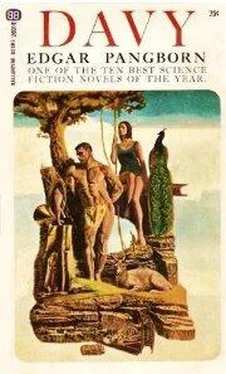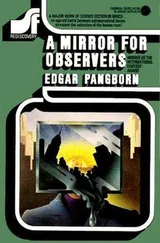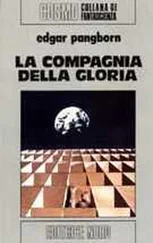Nickie asked: “How’d old Cliffbottom’s wife come to nag and yak so if English hadn’t been invented?”
Not a bit demongrelized, I told my wife: “She was slightly ahead of her time.”
While “Greensleeves” was still being applauded I heard the black-beard rumble at us: “Put the lid on, kids. They look ripe for Mother.” And as I was wishing I had a clue to what he meant, he said to me carelessly, pleasantly — I might have been underfoot for years and he so used to me he hardly saw me — “Stick around, Red.”
I gulped and nodded. He slouched over to that wagon that held the boxes. The banjo girl pulled me down to sit beside her again and slid a friendly arm around me. “That’s Pa Rumley,” she said. “Next time he speaks to you you say ‘Uhha, Pa.’ ’S the way he wants to hear it is all. And don’t worry, I think he likes you. I’m Minna Selig, so what’s your name, dear?”
Hoy! That was demortalizing if you like. I found out soon enough that Rambler people call each other “dear” all the time, and it doesn’t necessarily mean sweethearting, but I didn’t know it then, and she knew I didn’t. Close to my other ear, the little devil with the mandolin said: “And don’t worry, I think Minna likes you. I’m Bonnie Sharpe, so tell me your name too — dear.”
“Davy,” says I.
“Oh, we think that’s nice, don’t we, Minna?”
Yes, they really worked me over. Well, but for the girls and their mild mischief and warmth and good humor, the end of “Greensleeves” might have been the end of my courage: I might have gathered the rags of my dignity around my shoulders and fled back over the fence with no more word even to Sam about what I wanted most in the world, which was to be accepted by these people and stay with them on their travels as long as they’d have me.
Pa Rumley standing in the back of that wagon flung up his arms. “Friends, I hadn’t meant for to give you this here message of good tidings till later in the day, but you being drawed by our music — and our kids love you for the nice hand you give ’em — why, I’ll take it as a sign to speak a few words, and you pass ’em on to your dear ones. Open up that gate and gether round, for lo, I bring hope to the sick and lorn and suffering — draw nigh!”
It was a pleasant custom in practically all villages and middle-sized towns that had no bigger park, to lend the Ramblers the town green for the duration of their stay, as a camp-site and show area; townfolk wouldn’t normally intrude unless specially invited. I’d broken the rule. I think the reason why the girls said nothing about it was my natural-born goofy look, which often does wonders for me. The yucks opened the gate now at Pa Rumley’s invitation, and drifted in, shy, and with the yuck’s invariable anxiety to watch out against swindling — much good it does him. There were twenty-odd men and half again as many women gathered around the wagon, aggressively doughfaced, wanting to be convinced of something, it didn’t much matter what. I saw Sam had strolled in with them. He stayed in the rear; when he caught my eye over a flock of bonnets and broad straw hats he shook his head slightly, which I took to mean that he had something cooking I’d better not disturb.
“There you are, friends, step right close!” A man would give a lot to own a voice like Pa Rumley’s, big as a church bell but able to go soft as a little boy whispering in the dark. “This here is going to be a blessed day you’ll long remember. You seem to me like fine intelligent souls, responsible citizens, men and women who’ve kept the fear of God in their hearts and evermore prayed and done their share. That’s what I’ll say to myself whenever I think of Humber Town, and good Mayor Bunwick who let us have these fine accommodations, and done so much for us — no sir, folks, Ramblers don’t forget, never believe it if you hear they do. My friendship with your Mayor Bunwick, and the Progress Club, and the Ladies’ Murcan Temperance Union — this is a memory I’m about to cherish all my days.” As for Bunwick, the old fart certainly wasn’t there at that time in the morning, but a number of his ratty cousins undoubtedly were, to say nothing of the ladies — besides, Pa always said that if you set out to kiss an ass you might just as well kiss it good. “Now, friends, you must have seen how this world is a vale of tears and mis’ry. 0 Lord, Lord, don’t Death on his white charger go day and night raging and stomping up and down amongst our midst? — well, gentlemen hark! Why, it might be there a’n’t a one of you except the children, God bless ’em, and maybe even some of them, that a’n’t been bereavered already by the grim reaper. And sickness — yes, I’m a-mind to talk to you about the common sorrows, them that must come soon or late to one and all. They a’n’t fancy things — step in a little closer now, will you? — oh no, nobody makes up stories about ’em, nor sad songs, but I say to you a man laid low by sickness, he’s gone, folks, just as sure as a hero done to death in battle for his b’loved fatherland, amen, it’s a fact.”
He gave them time to look around at each other wise and serious and agree that it was so. “Friends, I tell you there do be some sorrows that can’t never at all be healed except in the ev’loving hand of God and by the tooth of time that heals the blows of fate and dries up the tears of the wayworn, and gently leads, and allows the grass to grow green over lo, these many wounds. But concerning the grief of common sicknesses — now there, friends, I got a message for you.
“Forty-seven years ago, in a little village in the hills of Vairmant green and far away, there lived a woman, simple, humble, Godfearing, mild, like it might’ve been any one of the lovely companions and helpmeets I see before me right now in this good town — where I got to admit I a’n’t yet beheld a member of the tender sex that a’n’t lovely to behold.” (There were just two good-looking women in that whole expanse of landscape and I was sitting between them.) “That’s a fact, no flattery, gentlemen hark! Well, this gentle woman in Vairmant of whom I speak was bereavered of her good man in her middle years, and thereafter she devoted the remainder of a long and blessed life to the healing of the sick. Even her name was humble. Evangeline Amanda Spinkton was her name, and I want you should remember that name, for it’s a name you’ll come to bless with every breath you drawr. Some do say, and I believe it, that Mother Spinkton — ah yes, so a grateful world calls her now! — had in her veins the mystic Injun blood of Old Time. That’s as may be, but there’s no doubt at all the dear angels of the Lord guided her in her lifelong endeavor, her search after them essences of healing that the Lord in his infinite wisdom and mercy has placed obscurely in the simple yarbs that do dwell in the whispering woods or the sunkissed fields or along the gently murmuring streams—”
That gives you his style anyway. Pa never let anyone else handle the pitch for Mother Spinkton; even if he was down sick in bed and too mis’ble to live he’d r’ar up out of it to take care of that. He said he reverenced her too much to let any mere God-damn crumb-bum piddlebrained assistant lay a mortal hand on her sacred hide. He claimed also that he could taste and smell a crowd with a special knack nobody else possessed — except his grandfather of course, dead going on forty years — and this knack always told him right off whether to use gently murmuring streams or dark murmuring caverns. Either one might work all right — oh sure, it would work, he’d say, and spit over the footboard between the mules if he was driving, which he liked to do — it’d work, but the g.m.s. yucks are the common type, and the dark caverns type is different, that’s all, and it’s the mark of a real artist to be able to spot that difference and govern yourself accordingly. Long Tom Blaine used to give him an argument about it when the weather was right — Tom said yucks are yucks and that’s it.
Читать дальше












